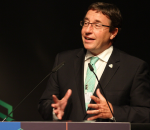 5 May 2015: In an address at the opening of the Conferences of the Parties (COPs) to the Basel, Rotterdam and Stockholm (BRS) Conventions, UN Environment Programme (UNEP) Executive Director Achim Steiner stressed that 2015 is a pivotal year for environment and development policy making, and said the sound management of chemicals and waste can support the implementation of many of the proposed Sustainable Development Goals (SDGs), including those on poverty eradication, health, agriculture, water, industrial growth and employment.
5 May 2015: In an address at the opening of the Conferences of the Parties (COPs) to the Basel, Rotterdam and Stockholm (BRS) Conventions, UN Environment Programme (UNEP) Executive Director Achim Steiner stressed that 2015 is a pivotal year for environment and development policy making, and said the sound management of chemicals and waste can support the implementation of many of the proposed Sustainable Development Goals (SDGs), including those on poverty eradication, health, agriculture, water, industrial growth and employment.
The “triple COP” opened on 4 May 2015, in Geneva, Switzerland. Steiner lauded the synergies process that brought the three Conventions together, highlighting increased efficiency and effectiveness at the national and global levels. He also highlighted increased and expanded cooperation and coordination between the BRS Secretariat and the UNEP Chemicals Branch, specifically with the Strategic Approach to International Chemicals Management (SAICM) and the Interim Minamata Convention on Mercury Secretariats.
Stressing the importance of providing a fully integrated approach to financing sound chemicals management, Steiner said such an approach includes: mainstreaming chemicals and wastes into national development; working with industry to deliver on their responsibilities; and dedicated external financing through the Global Environment Facility (GEF) and the Special Programme, which was established to support institutional strengthening for implementation of the BRS Conventions, the Minamata Convention and SAICM.
Steiner added the collaborative work among the Conventions will enable the tackling of difficult issues, such as DDT use and the safe disposal of polychlorinated biphenyls (PCBs), citing the DDT Global Alliance and the PCB Elimination Network as initiatives established to address these issues.
He asked Parties to the three Conventions to consider: how they can best use the outcomes of the Integrated Approach and the Special Programme to strengthen implementation at the national and regional levels; how UNEP, the Secretariat and other partners can best support Parties’ efforts; and how to ensure the scientific base is properly taken into account in decision making, including in the post-2015 development agenda.
Speaking to journalists, also on 4 May, Steiner stressed the need to find a solution to the “tsunami of e-waste rolling out over the world.” He said e-waste not only comprises a large percentage of the world’s non-recyclable “waste mountain,” but also that many of its elements are potentially hazardous to the health of people and the environment. He lamented that much of what is being thrown away is reusable, and pointed to the Basel Convention’s potential to help people better dispose of their e-waste.
The COPs of the BRS Conventions are meeting from 4-15 May 2015 in Geneva, Switzerland. [Statement of UNEP Executive Director] [UNEP Press Release] [IISD RS Meeting Coverage] [IISD RS Story on Opening of Triple COP]